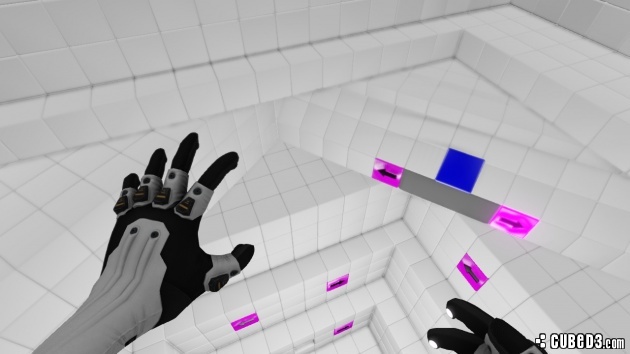Q.U.B.E. Director's Cut (Wii U) Review
By Lex Firth  16.09.2015
16.09.2015

Synonymous with Valve's PC gaming revolution, Portal is now a household name; its blue/orange motif, witty antagonist and oft-quoted tagline - "Now you're thinking with portals!" - are known universally among gamers. Spawning a multi-award-winning sequel, and with clamouring for a third game reaching near-Half Life levels, it makes sense that imitators would crop up, as with any major success. Enter, then, indie team Toxic Games' Q.U.B.E. Director's Cut, which bears more than a passing resemblance to the 2007 hit. Following on from the Xbox One and PlayStation 4 reviews, Cubed3 takes on the Wii U edition.
An updated version of a 2011 PC release, this downloadable puzzler immediately throws players into a mysterious space station. The Portal influence is visible straight away from the environment - the white cubes that make up the area's walls, ceiling and floor share the same sterile aesthetic previously seen in Valve's game. Meanwhile, a disembodied voice guiding the player through a tutorial area brings back memories of the Test Chambers, while the plot's intriguing thinness (owing to a convenient case of amnesia) replicates the confusion and suspense of Chell's adventure.
Of course, it would be unfair to subject the entire game to these comparisons, as it does attempt to carve its own path, as far as gameplay goes. First-person puzzle-solving is where the two games meet, but they then set off in different directions; where Chell was given the famous portal gun, Q.U.B.E. entrusts its protagonist with a special pair of gloves, which can manipulate coloured cubes strewn around the area.
From here, the gameplay is sent in various, ever-wilder directions. What starts off with simple puzzles (such as activating and deactivating footholds and springs in order to reach higher ledges) turns into a collection of truly confounding conundrums, presenting tasks involving rotating labyrinths, refracting paths of light, and remembering the positions of cubes in a darkened room.

This is all tied together with some admittedly ropey platforming - jumping across even the simplest gap is much more difficult in the first person - but on the whole, it's an impressive selection with a fair few truly difficult puzzles, which are sure to have some reaching for the nearest walkthrough. If there is one complaint to be had, it's that the game does at times feel somewhat disjointed; where other puzzle games are constantly developing and building on existing ideas, Q.U.B.E. keeps its concepts disparate. Each stage deals with a different mechanic, such as the aforementioned level in which the entire area becomes pitch black, with only one colour of cube visible at a time. This develops naturally over the course of 15-20 minutes, but upon completion of this stage, the mechanic is hurriedly switched out for another gimmick. By expanding the game's scope, this system ultimately limits its finesse, forcing the developers to consistently attempt to innovate, with various degrees of success, and giving less enjoyable concepts (such as rolling a ball into a hole, a simple task made much more frustrating by a slightly broken physics engine) the same amount of airtime as the game's shining moments.
Glitches do occasionally hamper the experience. As mentioned, the physics engine does have its off moments when balls won't roll as expected or magnetised boxes refuse to actually obey the laws of magnetism. The audio also suffers from bugs; sound effects often won't play entirely, meaning that timing-based puzzles in which it is vital to know when something is happening outside the limited first-person view are far more irritating than they need to be.

Perhaps that is the problem with aping such a successful franchise. On one hand, a tried-and-tested formula has already been developed, meaning that Toxic Games merely has to follow the breadcrumbs dropped by Valve - but on the other, it means that everything present in Q.U.B.E. has been done before, but better. To compare the project of a small group of students (albeit one that has had almost four years of opportunity for refinement) to one from the developers of Half-Life is to potentially ignore the limitations of an indie team, but when the similarities are so obvious (and seemingly intentional), it's difficult not to be reminded of the alternatives.

Cubed3 Rating
Good
Q.U.B.E. Director's Cut suffers from an identity crisis. While its brand of puzzling is unique and enjoyable, the overall package is disjointed, lacking, and, ultimately, has been done better. It's easily recommendable to puzzle obsessives and fans of Portal's atmospheric storytelling, but it fails to stand out in its own market.
Comments
Comments are currently disabled

 Sign In
Sign In Game Details
Game Details
 Out now
Out now  Out now
Out now  None
None  Out now
Out now  Subscribe to this topic
Subscribe to this topic Features
Features





 Top
Top

